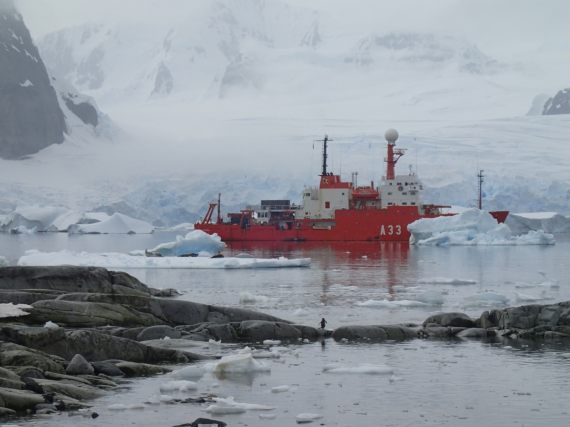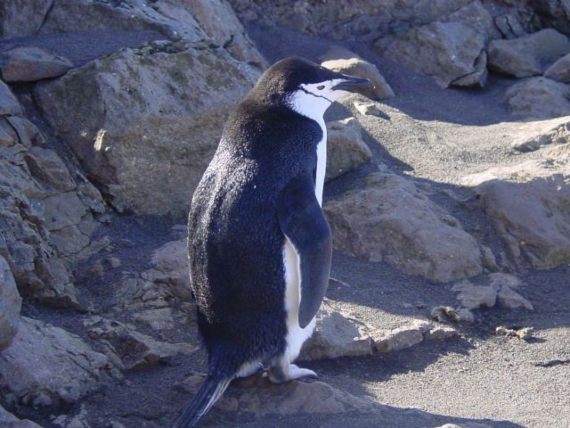Patricia Fernández de Lis, a scientific journalist, spoke with Ana Justel, a Statistics Professor at the Autonomous University of Madrid and one of the leading experts on Antarctica, about how the data collected in such a remote environment can help us to better understand the effects of climate change.
After eight campaigns in Antarctica, why are you so hooked on this continent?
The opportunity to work in Antarctica is something that few people have within their reach. The work is addicting, the way of life there is addicting. Antarctica is the place where humans have had less presence and it is nature in an absolutely pure state. It combines my interest in nature and in research, and this work gives me the opportunity to challenge myself and enhance my abilities in a unique and captivating environment.
Tell us a little bit about the type of work you do there.
I am part of a multidisciplinary team in the ‘Microairpolar’ project. We are focusing on studying microorganisms that are transported by air in polar areas. Our goal is to understand the colonization processes of the most basic forms of life and the impact of microorganisms on the environment.

The project requires the collaboration of experts in different disciplines, including biology, meteorology, atmospheric physics, and mathematical modeling. I lead the mathematics aspect of the project, which includes using statistical models and modeling to analyze the data obtained.
And what makes a statistic in Antarctica?
Before heading to Antarctica, we plan the campaign and decide what samples to collect. And once we are in the field, we work together to gather the data. Going to Antarctica and collecting these samples is crucial to understanding the value and cost of data – both in terms of the effort it takes and the financial cost. The data collected in Antarctica are valuable, but often difficult to obtain and analyze due to the brief duration of the campaign and the complexity of the samples. Therefore, it is necessary to develop new methods to analyze these data and make the most of them. Statistics are like the “microscope of data” and I have realized the importance of developing new techniques and methods to analyze these valuable, costly data.
So you are extracting ‘gold’ from these data
Exactly, the ultimate goal is to obtain the most valuable and useful information from the data. And this sometimes requires developing new techniques and tools to be able to analyze them. Statistics is a very powerful tool in this sense, but sometimes using more advanced or sophisticated techniques might be needed in order to be able to obtain precise and reliable results. Without a doubt, it is important to take into account the value of the data and work hard to extract all the information they can provide.
And what have these data from the campaigns in Antarctica told you so far?
It is interesting how data and technology are making it possible to discover new connections and patterns in nature that were previously unknown. The connection among microorganisms from opposite poles is surprising, as they were considered isolated ecosystems. Also, the fact that the air is such a powerful means of transportation is an important revelation, as it allows microorganisms to disperse over considerable distances.

However, this discovery also raises new challenges. The microbial ecosystems in Antarctica are exposed to the arrival of invasive species due to climate change, which can have a significant impact on the complexity and diversity of ecosystems in Antarctica. It is important to continue researching and monitoring these ecosystems in order to better understand the impacts of climate change and take effective measures to protect biodiversity on the entire planet.
And how is climate change affecting these microorganisms? What kind of changes are they being subjected to?
Antarctica is a very fragile, unique ecosystem and any change in the climate or in biodiversity can have a significant impact on the entire planet. The biodiversity in Antarctica is key to many aspects of scientific research – from marine biology to human health. In addition, Antarctica is an important regulator of the global climate and any change in temperature or in the amount of sea ice can have a global impact on the climate and climate patterns. It is important to continue researching and monitoring Antarctica and its ecosystems in order to be able to understand and prevent the negative impacts of climate change and protect its biodiversity and unique ecosystems.

What do you think of the youth movement to fight climate change? Do you think it is a source of hope for the future?
Young people’s awareness and participation in the fight against climate change is very positive and promising. It is important that education plays a crucial role in developing this awareness and knowledge of this issue so that future generations are better prepared and can make informed decisions. Environmental education is essential for helping youth understand the magnitude of the problem and how they can make a difference. At the same time, it is important for young people to get actively involved and do their part – either through individual or group initiatives – to work together toward a sustainable future.
Comments on this publication